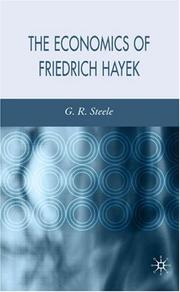| Listing 1 - 2 of 2 |
Sort by
|

ISBN: 1403943524 1349522171 9781403943521 9786610857371 1280857374 023080148X 9781403943538 9780230801486 Year: 2007 Publisher: Basingstoke Palgrave
Abstract | Keywords | Export | Availability | Bookmark
 Loading...
Loading...Choose an application
- Reference Manager
- EndNote
- RefWorks (Direct export to RefWorks)
In this updated and expanded edition, the author explores the broad features of Hayek's economic philosophy, shows the interrelationship between the liberal philosophy and economic advance, examines Hayek's approach to the problems of a money economy, and explains Hayek's aversion to all forms of centralized economic planning.
Economics --- Austrian school of economics --- History --- Austrian school of economics. --- Austrian school of economics - History. --- Economics. --- Economics - History - 20th century. --- Hayek, Friedrich A. von. --- History. --- Business & Economics --- Economic Theory --- 929 HAYEK, FRIEDRICH --- Biografie. Genealogie. Heraldiek--HAYEK, FRIEDRICH --- -Austrian school of economics --- -330.092 --- Austrian school of economists --- Marginalist school of economics --- Schools of economics --- Marginal utility --- Economic theory --- Political economy --- Social sciences --- Economic man --- -Electronic information resources --- Hayek, Friedrich A. von --- Hai-yeh-kʻo, --- Hayek, Friedrich August von, --- Hayek, F. A. von --- Haiekʻŭ, Pʻŭridŭrihi A., --- Khaĭek, F. A., --- Hayek, Frederich August von, --- Von Hayek, Friedrich A. --- Hayeke, --- 哈耶克, F.A. 冯, --- 哈葉克, --- 海耶克, --- Electronic information resources. --- E-books --- von Hayek, Friedrich August, --- Economics - History - 20th century --- Austrian school of economics - History --- von Hayek, Friedrich August, - 1899-1992
Book
ISBN: 0300228228 9780300228229 0300249179 Year: 2019 Publisher: New Haven, Conn. Yale University Press
Abstract | Keywords | Export | Availability | Bookmark
 Loading...
Loading...Choose an application
- Reference Manager
- EndNote
- RefWorks (Direct export to RefWorks)
A group history of the Austrian School of Economics, from the coffeehouses of imperial Vienna to the modern-day Tea Party The Austrian School of Economics-a movement that has had a vast impact on economics, politics, and society, especially among the American right-is poorly understood by supporters and detractors alike. Defining themselves in opposition to the mainstream, economists such as Ludwig von Mises, Friedrich Hayek, and Joseph Schumpeter built the School's international reputation with their work on business cycles and monetary theory. Their focus on individualism-and deep antipathy toward socialism-ultimately won them a devoted audience among the upper echelons of business and government. In this collective biography, Janek Wasserman brings these figures to life, showing that in order to make sense of the Austrians and their continued influence, one must understand the backdrop against which their philosophy was formed-notably, the collapse of the Austro†'Hungarian Empire and a half†'century of war and exile.
Austrian school of economics --- Economics --- History. --- Philosophy. --- Economic schools --- History --- Philosophy --- Austrian school of economists --- Marginalist school of economics --- Schools of economics --- Marginal utility --- Austrian school of economics - History --- Economics - Austria - History --- Economics - Philosophy --- Austria. --- al-Nimsā --- Alpen- und Donau-Reichsgaue --- Ao-ti-li --- Austrian Republic --- Ausztria --- Autriche (Republic) --- Avstrii︠a︡ --- Avstrija --- Avusturya --- Deutschösterreich --- German Austria --- Österreich --- Ostmark --- Østrig --- Osṭriyah --- Ōsutoria --- Rakousko --- Republic of Austria --- Republik Österreich --- Europe
| Listing 1 - 2 of 2 |
Sort by
|

 Search
Search Feedback
Feedback About UniCat
About UniCat  Help
Help News
News